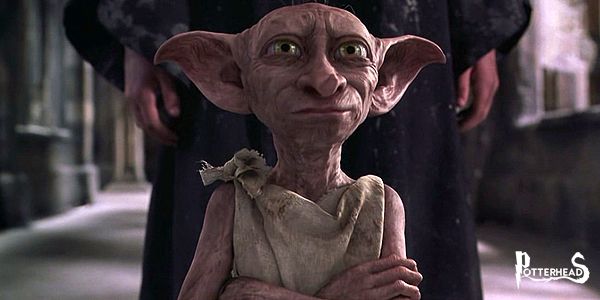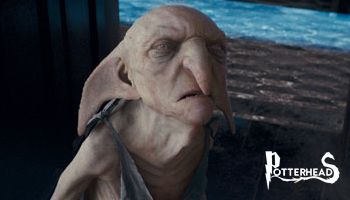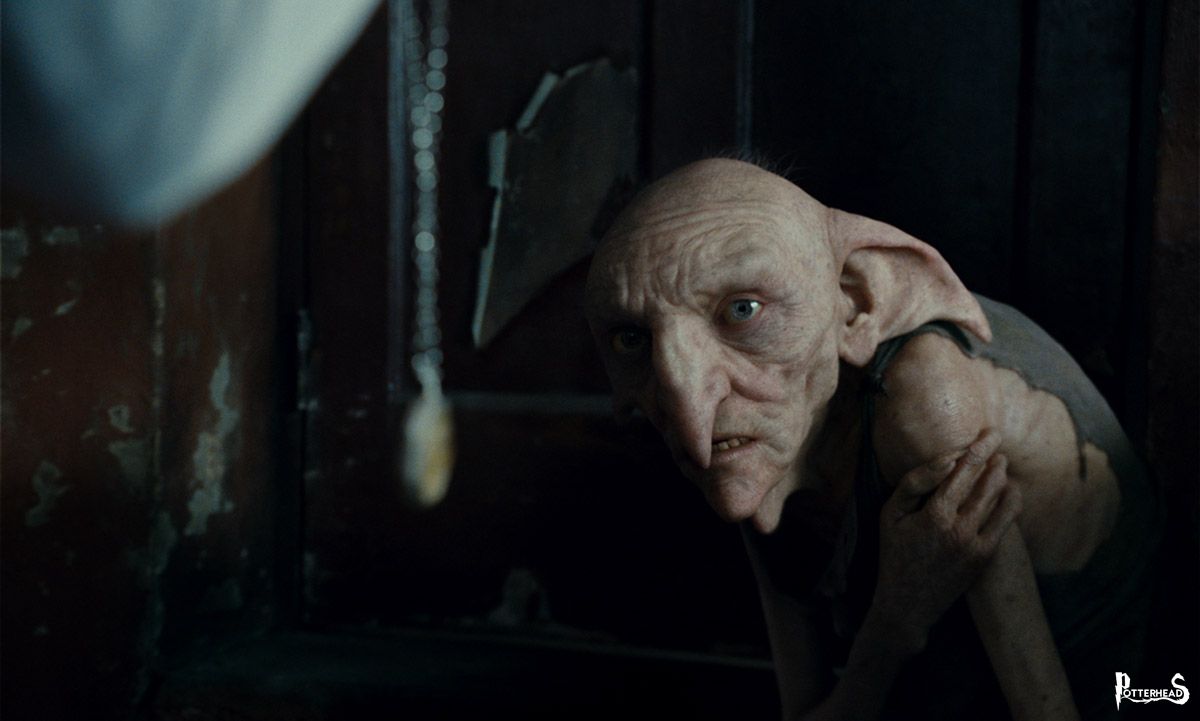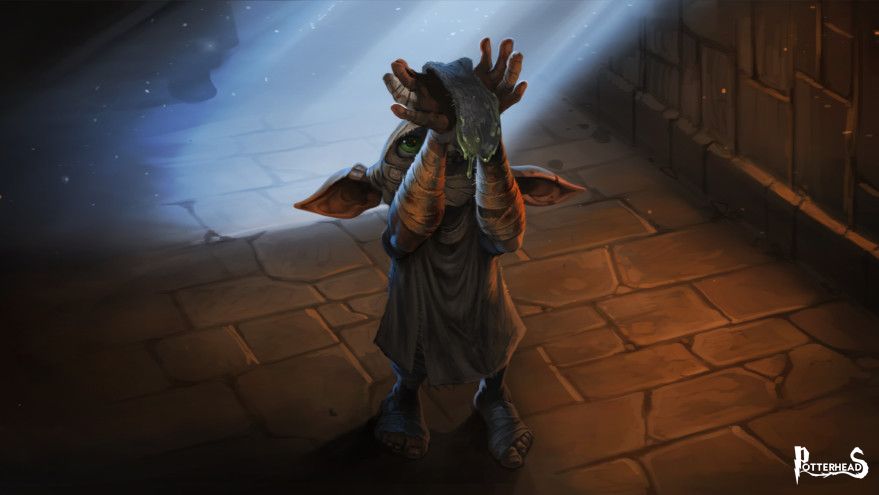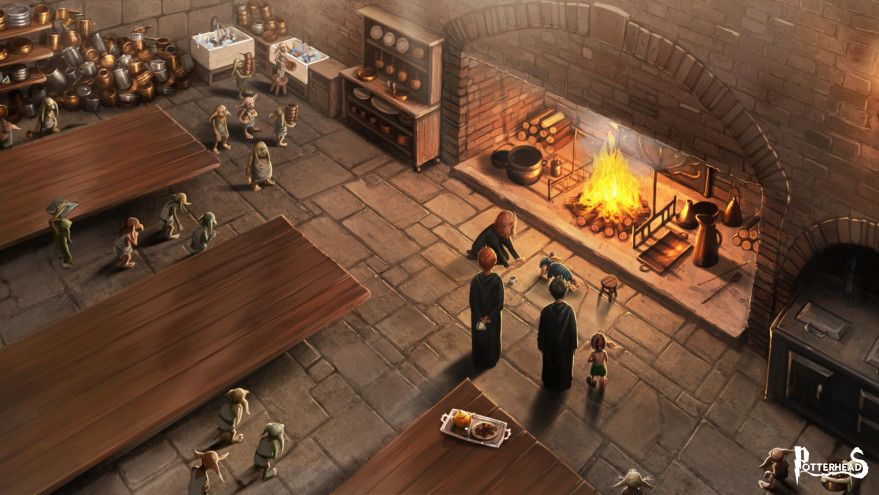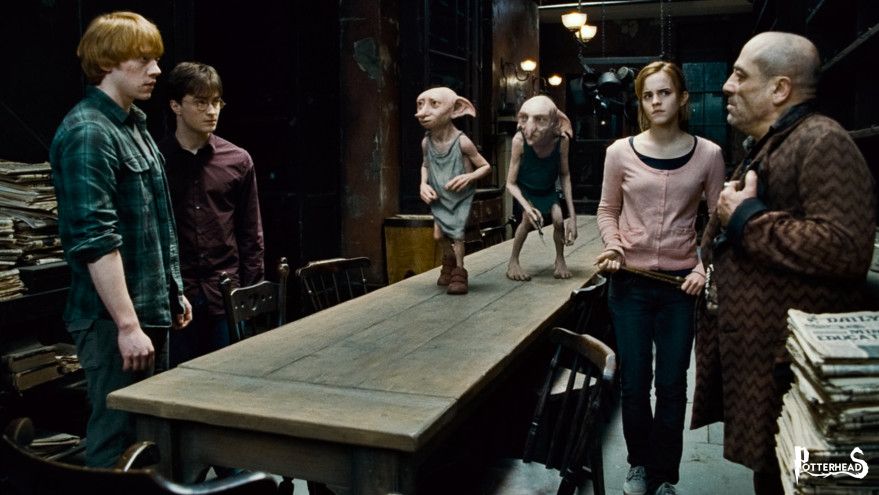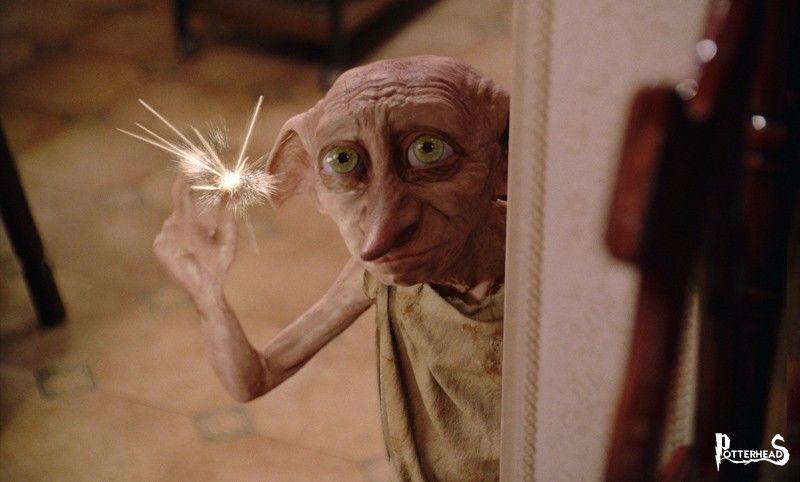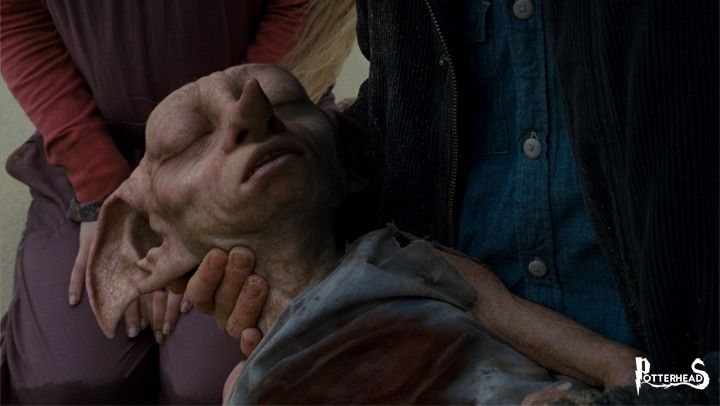Elfi domestici in Harry Potter e i Doni della Morte
(anche House-Elves in Harry Potter and the Deathly Hallows by Leanne Bruno)
Pagina Catalogata come
Supposizioni, teorie, approfondimentiProveniente da ricerca Silente - Vedi alternative
 Testo Originale
Harry Potter e i Doni della Morte
Testo Originale
Harry Potter e i Doni della Morte è fantastico, la degna conclusione della serie di libri che tutti noi conosciamo e amiamo. Ci sarebbero così tanti elementi da esplorare ed esaminare e, fra i molti, io ho deciso di dedicare la mia attenzione agli
elfi domestici.
Gli elfi sono stati introdotti nel
secondo libro della serie e in ogni libro hanno avuto diversi ruoli. Nel settimo libro, otteniamo profili diversi di elfi domestici in tutto il loro splendore.
Paradossalmente, gran parte della loro gloria risiede nella loro servitù e umiltà. Questo pensiero capovolto non ha origine dalla mente di JK Rowling, brillante, infatti per esempio, il tema della servitù è ampiamente esplorato nei Vangeli cristiani. Ora, siamo incerti sulle le tendenze teologiche trovate nei suoi testi, però non possiamo affermare, che la nostra Rowling intenzionalmente abbia creato gli elfi domestici con i testi biblici in mente. Tuttavia, vorrei sottolineare come gli elfi domestici sono un esempio fantasioso del genere di servitù, esattamente come Cristo esplorato nei vangeli cristiani.
Il primo elfo domestico che vediamo nel settimo libro è
Kreacher. Noi tutti ricordiamo come era maleducato e crudele Kreacher nell’Ordine della Fenice, rimproverando tutti e chiamandoli "
mezzosangue" e "traditori di sangue", e infine, diventando il mezzo con cui
Voldemort è in grado di ingannare Harry e causare la morte di
Sirius Black. Nessuno si aspettava nulla, specialmente l'odio e l'astuzia da Kreacher. Eppure, facilmente, notiamo la trasformazione di Kreacher nei ‘Doni della Morte’.
Harry Potter lo costringe a raccontare la sua storia pietosa, e la lealtà nei confronti di
Regulus, compresa nella linea dolorosa, ossia la "legge suprema del elfo domestico è l'offerta del suo Maestro"(HP DdM 10).
Harry vede l'importanza di trattare il suo servo con dignità e rispetto, e gli affida anche il
medaglione di R.A.B. (HP DdM 10). Kreacher è fuori di sé dalla gioia e delizia per servire Harry da questo punto in poi. Quando non sono in grado di tornare a
Grimmauld Place, Harry osserva con afflizione che era stato il loro unico rifugio sicuro: anche, ora che Kreacher era molto più felice e più amichevole, la ritenevano una sorta di casa (HP DdM 14).
Kreacher aveva fatto l’elfo-domestico per il piacere di fare: servire i loro padroni, e prendere la gioia nel farlo.
Successiva vediamo
Dobby, il tenero (ma a volte fastidioso) personaggio che Harry ha liberato nella ‘Camera dei Segreti’. Esempi di desiderio di Dobby per proteggere e restare fedeli a Harry abbondano in diversi libri, tra cui i suoi dolorosi tentativi per proteggere Harry dal piano di
Lucius Malfoy nella ‘Camera dei Segreti’ , l'uso dell'
Algabranchia per aiutare Harry nel ‘Calice di Fuoco’, il suo aiuto nel rivelare la
Stanza delle Necessità ne l' ‘Ordine della Fenice’, e il suo pedinamento di
Draco Malfoy nel ‘Principe MezzoSangue’. La maggior parte di questi atti di coraggio, lealtà, e servitù sono avvenuti dopo che Dobby è stato liberato dalla schiavitù. Egli sceglie di aiutare Harry, che è sempre stato gentile e rispettoso con lui. La scelta più toccante che Dobby fa è, naturalmente, nei ‘Doni della Morte’, quando Dobby appare coraggiosamente dai suoi precedenti proprietari, (la famiglia Malfoy) per salvare Harry e i suoi amici (HP DdM 23).
Dobby sacrifica la sua vita per servire e aiutare Harry, anche se non era tenuto a farlo. Egli era "Dobby, un elfo libero", l'epitaffio che Harry incide faticosamente sulla sua lapide. Era nella sua natura, servire e dare disinteressatamente. Questa verità non si perde su Harry, che scava a mano la tomba di Dobby senza usare la magia.
E' il dolore di Harry per la morte sacrificale di Dobby, combinato con il lavoro fisico di scavo, che fornisce al ragazzo, con sempre maggiore chiarezza di pensiero, l’illuminazione del suo percorso in avanti da questo momento. Per la prima volta Harry è in grado di chiudere la mente a Voldemort, i quali non potevano penetrare Harry, ora, mentre lui piangeva Dobby. Sofferenza, a quanto pareva, si opponeva a Voldemort . . . anche se
Albus Silente, ovviamente, avrebbe detto che si trattava di amore. . . Harry mette da parte il desiderio ossessivo per la
Bacchetta di Sambuco, che aveva minacciato di distrarlo dal suo obiettivo di distruggere gli
Horcrux (HP DdM 24).
Dobby e la realizzazione di essere un elfo domestico dalla mole di servire gli altri è davvero profonda. Harry non è l'unico ad essere scosso da una più piena comprensione del significato e del valore degli elfi domestici. Scherzando, vediamo il momento, del quale, siamo stati tutti in attesa, da un periodo di sei lunghi libri, Hermione e Ron, finalmente, si baciano e si arrendono per l'attrazione che condividono l’uno per l'altro.
L'impulso? La dichiarazione di Ron, nel bel mezzo della feroce battaglia finale di Hogwarts, a proposito di elfi domestici in cucina.
«Un momento!» fece Ron, brusco. «Abbiamo dimenticato qualcuno!» «Chi?» chiese Hermione.
«Gli elfi domestici, saranno tutti giù in cucina, no?»
«Vuoi dire che dobbiamo farli combattere?» domandò Harry.
«No» rispose Ron, serio. «Dobbiamo farli andar via. Non vogliamo altri Dobby, no? Non possiamo chiedergli di morire per noi...»
Le zanne di Basilisco caddero con un gran fragore dalle braccia di Hermione. Corse da Ron, lo abbracciò e lo baciò sulla bocca. Ron gettò via le zanne e il manico di scopa e rispose con tanto entusiasmo che sollevò
Hermione da terra. - HP DdM 31
Questo è tutto quel che Hermione ha bisogno di sentire per essere pienamente convinta della maturità di Ron e la crescita emotiva,e che è finalmente degno del suo amore.
L'ultima scena in cui vediamo gli elfi domestici nei ‘Doni della Morte’ è un Kreacher trionfante, leader di un esercito di elfi domestici di Hogwarts nella battaglia finale. L'immagine è troppo preziosa e accattivante per sorvolarla.
Gli elfi domestici di Hogwarts sciamarono nella Sala d'Ingresso, urlando e brandendo trincianti e mannaie; al loro comando, col medaglione di Regulus Black che gli ballonzolava sul petto, c'era Kreacher, la voce da rana chiara e sonora anche sopra quel baccano. «Lottate! Lottate! Combattete per il mio padrone, difensore degli elfi domestici! Combattete il Signore Oscuro, nel nome del prode Regulus! Lottate!» - HP DdM 36
La natura del elfo domestico, che si diletta veramente a servire, è aperta alla corruzione dalle streghe e maghi del mondo di Harry. La schiavitù degli elfi dalla magia oscura rende gli elfi domestici amari e svianti.
Winky è un triste esempio di servitù e segreto mantenimento dei maestri che non rispettano e onorano gli elfi domestici come dono della natura. Kreacher, disprezzato da Sirius, è terribile fino a quando mostra rispetto per Harry. Anche Hermione, con i suoi tentativi ben intenzionati e divertenti per liberare gli elfi con il suo "
C.R.E.P.A." in realtà non apprezza la purezza e la bontà del dono di umiltà che gli elfi domestici incarnano.
Solo quando hanno padroni gentili e benevoli (Silente a Hogwarts, Harry a Grimmauld Place) la grandezza di un elfo domestico si rivela per davvero.
Silente, in tutta la sua sapienza e la benevolenza, ha riconosciuto il valore della servitù e l'umiltà che gli elfi domestici incarnano. Quando si sta chiacchierando con Harry nel capitolo intitolato "King Cross", spiega dell'ignoranza di Voldemort.
«E la sua conoscenza è rimasta terribilmente lacunosa, Harry! Ciò che Voldemort non ritiene importante, non si dà la pena di comprenderlo. Di elfi domestici e storie per bambini, di amore, fedeltà e innocenza Voldemort non sa e non capisce niente. Niente. Che tutti hanno un potere che va oltre il suo, oltre la portata di qualunque magia, è una verità che non ha mai afferrato. - HP DdM 35
Come per i personaggi degli elfi domestici, la grandezza di diventare un servo è un tema che abbonda nella vita e nell'insegnamento di Cristo, come riferito nei vangeli biblici. Matteo 20:26-27 ricorda Gesù dicendo: "Ma chi vuol essere grande tra voi si farà vostro servitore."
Dopo Gesù lava notoriamente i piedi dei discepoli durante l'Ultima Cena, Gesù li istruisce: "Vi ho dato infatti l'esempio, che anche voi facciate come io ho fatto a voi. "(Giovanni 13:15).
E l'apostolo Paolo ricorda ai lettori che Gesù, "non considerò l'uguaglianza con Dio un tesoro geloso, ma si è fatto nulla, assumendo la condizione di servo. . . . "(Fil 2,4-6). Sono sicuro che ci sono altre opere letterarie che, come la serie di Harry Potter ei vangeli cristiani, sono personaggi che incarnano e personificano il servizio e l'umiltà, ma JK Rowling ha fatto magistralmente nella sua serie di Harry Potter, nelle grandi e umili personaggi di gli elfi domestici.
Come tanta letteratura fa, elfi domestici di JKR ci aiutano a comprendere una verità per mezzo di una storia.
Torna in cima
Testo Originale link
Harry Potter and the Deathly Hallows was a fantastic, satisfying ending to the book series we all know and love. There are so many elements to explore and examine in this work, and here I turn my attention to the house-elves. We were introduced to the creatures in the second book of the series and each book has had different roles for the elves to play. In book seven, we get glimpses of house-elves in all their glory. Paradoxically, much of their glory lies in their servitude and humility. This upside-down thinking does not originate in J.K. Rowling’s mind, brilliant though it is. For example, the theme of servanthood is widely explored in the Christian gospels. Now, as we are uncertain where JKR’s theological leanings lie, we cannot claim that she intentionally created house-elves with Biblical texts in mind. However, I’d like to point out how house-elves are an imaginative example of the kind of Christ-like servitude explored in the Christian gospels.
The first house-elf we see in DH is Kreacher. We all remember how rude and cruel Kreacher was in Order of the Phoenix, berating all the “Mudbloods” and “blood traitors,” and ultimately becoming the means by which Voldemort is able to trick Harry and cause the death of Sirius. No one expected anything but hatred and cunning from Kreacher. And yet, simply and beautifully, we see the transformation of Kreacher in DH. Harry forces him to tell his pitiful tale of loyalty to Regulus, including the poignant line “The house-elf’s highest law is his Master’s bidding” (DH10/195)[FN]. Harry sees the importance of treating his servant with dignity and respect, and also gives him Regulus’ locket (DH10). Kreacher is beside himself with joy and delights to serve Harry from this point on. When they are unable to return to Grimmauld Place, Harry notes regretfully that “it had been their one safe refuge: even, now that Kreacher was so much happier and friendlier, a kind of home” (DH14/271). Kreacher had done what house-elves delight to do: serve their masters, and take joy in doing so.
Next we see Dobby, the lovable (if sometimes annoying) character that Harry freed in Chamber of Secrets. Examples of Dobby’s desire to protect and remain loyal to Harry abound in several of the books, including his painful attempts to protect Harry from Lucius Malfoy’s sinister plan in CS, his procuring gillyweed to help Harry in Goblet of Fire, his assistance in revealing the Room of Requirement in Order of the Phoenix, and his tracking of Draco in Half-Blood Prince. Most of these acts of courage, loyalty, and servitude were after Dobby was freed from slavery. He chooses to help Harry, who has always been kind and respectful to him. The most poignant choice Dobby makes is, of course, in Deathly Hallows, when Dobby courageously Apparates into his previous owners manor to rescue Harry and his friends (DH23). Dobby sacrifices his life to serve and aid Harry, even though he was not bound to do so. He was “Dobby, a free elf,” the epitaph that Harry painstakingly engraves on his headstone. It was in his very nature to serve and to give selflessly. This truth is not lost on Harry, who manually digs Dobby’s grave. It is Harry’s grief over Dobby’s sacrificial death, combined with the physical labor of digging, that provides Harry with increasing clarity of thought, and which illuminates Harry’s path forward from this time. For the first time Harry is able to close his mind to Voldemort, whose “thoughts could not penetrate Harry now, while he mourned Dobby. Grief, it seemed, drove Voldemort out . . . though Dumbledore, of course, would have said that it was love . . . .” Harry now gives up the obsessive desire for the Elder Wand, which had threatened to distract him from his goal of destroying Horcruxes (DH24). Dobby the house-elf’s embodiment of the greatness of serving others is profound indeed.
Harry is not the only one to be shaken by a fuller understanding of the significance and worth of house-elves. Humorously, we see the moment we have all been waiting for during six long books—Hermione and Ron finally kiss and surrender to the attraction they have shared for each other. The impetus? Ron’s declaration, in the midst of the fierce final battle at Hogwarts, about the house-elves in the kitchen, “we should tell them to get out. We don’t want any more Dobbies, do we? We can’t order them to die for us . . . .” This is all Hermione needed to hear to be fully convinced of Ron’s maturity and emotional growth, that he is finally worthy of her love (DH31/625).
The last we see of house-elves in Deathly Hallows is a triumphant Kreacher, leading an army of the Hogwarts house-elves into the final battle. The image is too precious and endearing to gloss over. “The house-elves of Hogwarts swarmed into the entrance hall, screaming and waving carving knives and cleavers, and at their head, the locket of Regulus Black bouncing on his chest, was Kreacher, his bullfrog’s voice audible even above this din: ‘Fight! Fight! Fight for my Master, defender of house-elves! Fight the Dark Lord, in the name of brave Regulus! Fight!” (DH36/734).
The nature of the house-elf, who truly delights to serve, is open to corruption by the witches and wizards of Harry’s world. The enslavement of elves by Dark Wizards renders house-elves bitter and misguided. Winky is a sad example of servitude and secret-keeping of masters who don’t respect and honor the house-elves giving nature. Kreacher, despised by Sirius, is awful until shown respect by Harry. Even Hermione, with her well-intentioned and humorous attempts to free the elves with her “S.P.E.W.” does not really appreciate the purity and goodness of the self-giving humility that the house-elves embody. When they are under kind and benevolent masters (Dumbledore at Hogwarts, Harry at Grimmauld Place) their greatness truly shines.
Dumbledore, in all his wisdom and benevolence, recognized the worth of the servanthood and humility which the house-elves personify. When he is chatting with Harry in the chapter entitled “King’s Cross,” he explains of Voldemort’s ignorance: “And his knowledge remained woefully incomplete, Harry! That which Voldemort does not value, he takes no trouble to comprehend. Of house-elves and children’s tales, of love, loyalty, and innocence, Voldemort knows and understands nothing. Nothing. That they all have a power beyond his own, a power beyond the reach of any magic, is a truth he has never grasped” (DH35/710).
As with the characters of the house-elves, the greatness of becoming a servant is a theme that abounds in the life and teaching of Christ as related in the Biblical gospels. Matthew 20:26-27 records Jesus saying, “But whoever would be great among you must be your servant.” After Jesus famously washes the disciples’ feet during the Last Supper, Jesus instructs them, “For I have given you an example, that you also should do as I have done to you.” (John 13:15). And the apostle Paul reminds readers that Jesus, “did not count equality with a God a thing to be grasped, but made himself nothing, taking the form of a servant . . . .” (Phil. 2:4-6). I am sure there are other literary works which, like the Harry Potter series and the Christian gospels, have characters that embody and personify service and humility—but J.K. Rowling has done this masterfully in her Harry Potter series, in the great and humble characters of the house-elves. As so much of literature does, JKR’s house-elves help us to understand a truth by means of a story.
__________________________________________________________
Notes
[FN] All chapter/page references are to the American edition of Harry Potter and the Deathly Hallows.




 Testo Originale
Testo Originale